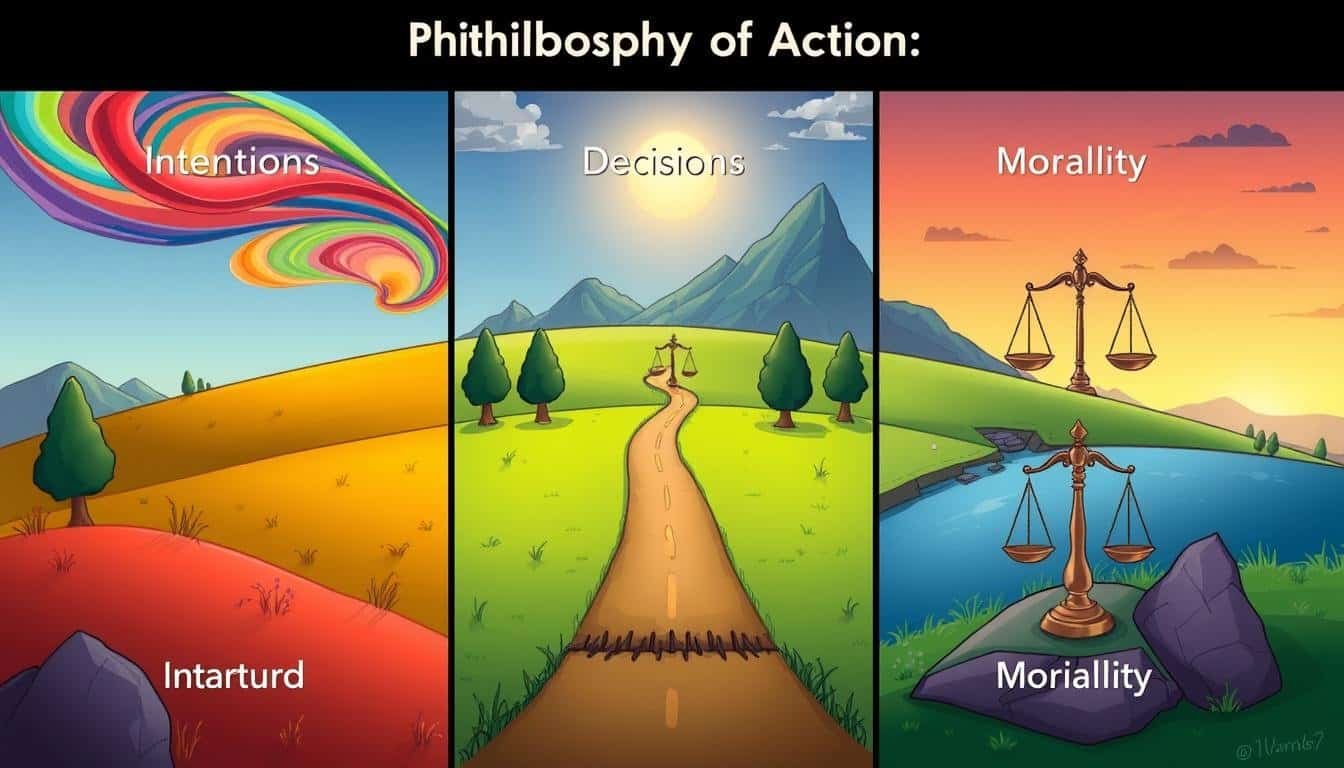Philosophy of Action: Intentions, Decisions, and Morality
Have you ever thought about if your goals are more important than what you actually do? This deep question is at the core of the philosophy of action. It looks at how our goals, choices, and sense of right and wrong mix together. In today’s complex world, thinking about our goals helps us understand ethics better and makes us question what we believe is right.
This article explores how our goals and the choices we make are linked, touching on old debates and new challenges. Famous thinkers like Elizabeth Anscombe and Donald Davidson share their views. They make us think differently about the line between our goals and what happens as a result. Let’s dive into the complex world of taking responsibility for our actions and making decisions based on ethics.
Key Takeaways
- The interplay between intentions and actions is central to understanding moral responsibility.
- Ethical theories help frame our perceptions of morality and decision-making.
- Elizabeth Anscombe’s thoughts inspire reevaluations of intentions in philosophical contexts.
- Common-sense morality raises challenges through its inconsistencies and tensions.
- The distinction between intention and outcome informs moral judgments significantly.
- Exploring different ethical perspectives enhances clarity on moral dilemmas.
- Commitment plays a vital role in understanding actionable intentions.
Understanding Intentions in Moral Philosophy
Exploring intentions gives us deep insights into moral philosophy. Intentions are key to understanding why we make certain choices. They show the ethics behind our actions. By looking at intentions, we see how they connect with ethics, agency, and moral responsibility.
Three Guises of Intention
Intentions come in different forms that affect our moral views. The first type is about future plans or desires for actions we haven’t done yet. The second is about the reasons behind our actions. The third is about the act of intending to do something.
These forms show that what we intend is important, not just the results. Many times, good intentions lead to bad outcomes. This shows the complex balance between what we plan and what happens.
The Role of Intention in Ethical Theories
Intentions are crucial in ethical theories. They help us judge right from wrong and take responsibility. The Doctrine of Double Effect talks about unintended harm and if it’s okay. This shows the tricky balance between what we mean to do and what actually happens.
Today, we see intentions as similar to beliefs and desires. This view makes us wonder if intentions are special or just like other thoughts. Philosophers have different views on this topic.
| Aspect | Details |
|---|---|
| Forms of Intention | Future intentions, intentions during actions, intentional actions |
| Moral Implications | Good intentions vs. unintended negative outcomes |
| Ethical Theories | Norms based on intentions, Doctrine of Double Effect |
| Philosophical Perspectives | Intentions as mental states, debate on uniqueness |
Looking into intentions helps us understand moral philosophy better. It makes us think about our own reasons and their effects on ethics. This encourages us to reflect on our motivations and their impact on our ethical choices.
Decision-Making and Moral Accountability
Looking into decision-making shows us a lot about moral accountability. Every choice we make shows how well we can act on our own. This idea of acting alone and making choices is key in moral philosophy. When we make decisions, we take on ethical responsibilities.
Agency in Decision-Making
Agency is crucial in making decisions. It shows how we are responsible for our actions. Most of us sometimes lie or cheat a little. Studies show this behavior is quite common.
People often make excuses for their actions to avoid blame. Professors Anand, Ashforth, and Joshi found six main excuses. These include:
- Denial of responsibility: Saying outside factors made us act that way.
- Denial of injury: Saying there was no real harm done.
- Denial of victim: Saying the victim was to blame.
These excuses help us feel like we’re not fully responsible for our bad actions. It’s important to watch out for these excuses to stay true to our values and make good choices.
The Intersection of Free Will and Decision
Thinking about free will and decision-making brings up big questions. Philosophers often debate how free will and moral responsibility work together. The Consequence Argument says if everything is determined, we can’t control our actions. But compatibilists believe we can still be responsible for our choices even if they’re determined.
Most studies focus more on blaming people than praising them. In our daily lives, we often blame others for small mistakes but don’t praise them for good deeds. This shows a strange part of human nature. Philosophers see moral responsibility in different ways, looking at both the future and past actions.
Rest’s model of moral reasoning offers a clear way to make ethical choices. It helps us tackle tough decisions and understand our own power to act.
| Rationalization Type | Description |
|---|---|
| Denial of Responsibility | Claims external factors influenced actions. |
| Denial of Injury | Asserts that no harm was done. |
| Denial of Victim | Argues that the victim deserved the outcome. |
Philosophy of Action: Intentions, Decisions, and Morality
The philosophy of action looks closely at how intentions and actions connect. It shows us a lot about moral responsibility. It helps us see how our actions, guided by our intentions, fit into the bigger picture of right and wrong.
Exploring the Relationship Between Intentions and Actions
In moral philosophy, intentions guide our actions. Legal systems judge actions by their results, but ethics looks at intentions too. Studies show that moral choices can make our brains work like they do in other situations.
When actions and inactions have the same effect, our thinking brain gets more active. But when actions cause harm, our feelings take over. This shows how important intentions are in judging right from wrong.
Moral Responsibility and Its Implications
Moral responsibility comes from thinking about actions and their effects. When we reason morally, we use ethical theories to guide us. These theories help us decide what’s right, like Utilitarianism or virtue ethics.
About 70% of these discussions focus on morality and its theories. This variety helps us understand how our intentions shape our choices. It gives us a full view of ethics.
| Theory of Morality | Focus | Key Aspects |
|---|---|---|
| Utilitarianism | Consequences | Overall goodness or utility of actions |
| Virtue Ethics | Character | Development of virtues and moral character |
| Feminist Ethics | Caring relationships | Emphasizes the role of care and moral response in ethics |
| Deontological Ethics | Rules | Moral obligations define right and wrong actions |
| Pragmatic Ethics | Practical outcomes | Focus on real-world implications rather than abstract principles |
| Social Contract Theory | Agreements | Moral and political obligations based on mutual agreements |
| Ethics of Care | Relationships | Importance of interpersonal relationships in ethical decision-making |
This look into moral responsibility shows it’s complex. It’s not just about blaming someone. It’s about how our intentions, ethics, and actions work together. The philosophy of action helps us understand how we make moral choices and the big role intentions play.
Rationality in Ethical Decision-Making
Rationality is key in making ethical choices. It helps people deal with tough moral situations. It’s about knowing the difference between what’s true and how we make decisions.
There are two types of rationality. Factual rationality looks at how well actions work and use resources. Methodological rationality means making choices based on knowledge and beliefs.
This helps us understand our moral duties when making decisions.
Defining Rationality in Moral Contexts
When making moral choices, we need to think about two kinds of rationality. Instrumental rationality is about getting the best results. Value rationality is about using the right methods.
This balance is seen in many situations. For example, Prospect theory shows how people make choices when there’s risk. It shows the complex nature of rationality.
Challenges to Rationality in Decision Processes
Even though we aim for rational choices, there are hurdles. Biases, emotions, and social pressure can lead to poor decisions. This affects our moral actions.
Studies show how the way information is framed can change our choices. Conflicts of interest can also make decisions harder. Knowing these challenges helps us make better ethical choices.
The Nature of Volition and Its Importance
Volition is a key mental state that helps us understand actions and their moral sides. It drives our decisions, linking agency with moral responsibility. By looking into volition, we see how it affects ethical theories and moral philosophy.
Volition as a Mental State
Volition means personal causality, showing how we connect with our actions. It’s the base of voluntary actions, which are hard to predict. This unpredictability can be a big plus in certain situations, like in penalty shots or stone-paper-scissors.
Studies like Libet’s experiment show how hard it is to predict when we’ll make a voluntary move. They help us understand how we make decisions.
Implications of Volition for Moral Philosophy
Volition does more than just let us choose; it deeply changes how we see moral responsibility. Ethical theories struggle with what happens when we act based on our will. Human behavior and how cockroaches react show the balance between our free will and outside forces.
Understanding the mental work behind volition makes us think deeply about who is to blame in moral situations.
Common-Sense Morality and Its Challenges
Common-sense morality is like an inner guide for making right and wrong choices every day. It comes from our gut feelings shaped by our culture and life experiences. Understanding this is key to seeing how it affects our ethical views and the complexity of moral judgments.
Understanding Common-Sense Morality
Common-sense morality is about the basic beliefs on what’s right and wrong that most people agree on. It’s important in how we react to tough moral choices. It shows our natural sense of doing what’s right when dealing with others. But, it can lead to confusion when we face complex moral theories that question our basic beliefs.
Contrasted Ethical Perspectives
Other ethical views, like utilitarianism and deontology, often differ from common-sense morality. For example, the Trolley Problem shows how our gut feelings and careful thought can disagree. These theories focus on the effects of actions, while common-sense morality might look at intentions or individual rights. This leads to debates on how reliable common-sense morality is in making moral decisions and ethical actions.
Intentions vs. Outcomes: A Moral Dilemma
The debate over intentions versus outcomes is a big challenge for ethics and moral responsibility. It asks, what matters more in judging right and wrong: the reasons behind an action or the effects it has? Knowing this is key to understanding how we make moral choices.
Assessing the Importance of Intention
Intentions are crucial in how we see someone’s morals. Studies show that actions done on purpose get judged more than those done by accident. When deciding on punishment, if someone meant to cause harm, that usually matters more than the outcome. This makes moral responsibility tricky, especially when good plans lead to bad results. It shows how important intentions are in our ethical views.
The Consequences of Actions and Their Moral Weight
Outcomes are also very important in judging right and wrong. They can be unexpected and depend on many things. Even though intentions are key, the moral impact of an action can change based on its outcome. If an action causes harm, even if the intention was good, it makes us question the person’s blame.
| Aspect | Intentions | Outcomes |
|---|---|---|
| Moral Judgment Weight | Often prioritized in evaluations | Significant, especially when harmful |
| Example of Impact | Well-meaning individual causing harm | Harmful result from poor intent |
| Ethical Theory Influence | Deontological perspectives emphasize intent | Consequentialist views focus on result |
| Judgment Process | Based on agent’s beliefs and purposes | Considered through the lens of causality |
Looking into both intentions and outcomes shows how complex moral dilemmas are. This helps us talk more deeply about moral responsibility, ethics, and dealing with the gray areas of human actions.
Agency and Moral Responsibility
The link between agency and moral responsibility is key in philosophical debates. It shows how our ability to make choices affects our moral judgments. Being able to make choices is crucial for being morally responsible for our actions.
The Role of Agency in Moral Judgment
Agency and collective responsibility often go hand in hand, sparking debate. Scholars question if groups can have moral agency and if their actions should be judged morally. Some believe moral agency belongs to individuals, not groups, which brings up questions about fairness.
There are new ideas about collective responsibility. Groups should work to fix harm and prevent it from happening again, without blaming anyone. Scholars look at norms and how they affect accountability for fixing harm. These discussions show how complex it is, especially when looking at group actions.
There’s ongoing debate about free will and moral responsibility. The link between legal and moral blame is not always clear, making it hard to understand actions influenced by luck or outside forces. Neuroscience adds to the complexity by showing our choices come from our brain’s workings.
Philosophers have different views on free will and moral responsibility. These views, like metaphysical libertarianism and hard determinism, add to the debate on agency’s role in moral judgment.
Evaluating Ethical Theories and Their Applications
There are many ethical theories in moral philosophy. Each one helps us understand right and wrong and how to make decisions. By looking at these theories, we see how they work in real life and what problems they have. This helps us deal with tough moral choices.
Exploring Various Ethical Frameworks
Here are some key ethical theories:
- Utilitarianism aims to make everyone happy and reduce pain. It’s used in big decisions.
- Deontology is about following rules and doing what’s right, based on Immanuel Kant’s ideas.
- Virtue ethics is about being good by having certain traits, like those Aristotle talked about.
- Consequentialism looks at the effects of actions to see if they’re right or wrong.
- Contractarianism says moral rules come from agreements people make with each other.
Common Critiques in Ethical Theorizing
These theories have some downsides. Here are the main issues:
- Some say utilitarianism ignores individual rights for the greater good.
- Deontology can be too strict, not flexible enough for complex situations.
- Virtue ethics might not give clear advice on what to do.
- Consequentialist theories can’t always predict the outcomes of actions.
- Contractarian ideas might not work for those not part of the original agreement.
These problems show why we need to keep improving these theories. They help us make better moral choices as society changes. Talking about these ideas is key to making them work better in real life.
Conclusion
This article has shown us how actions, intentions, and moral responsibility are deeply connected. Historically, actions came from desires and volitions. But today, philosophers like Donald Davidson and Thomas Reid make us think again about this simple idea.
They show us the complex nature of moral philosophy. This makes us think more about our actions and their effects. It shows that understanding moral responsibility is important in our daily lives.
Looking at the nature of actions and breaking them down is interesting. It makes us think about our moral judgments and the importance of agency. We see that dealing with moral dilemmas is a continuous process.
In the end, exploring the philosophy of action helps us understand the depth of intention and outcome. It makes us think more about our choices and their impact. This shows the importance of ethical responsibilities in our actions.
Source Links
- Intention
- Moral Theory
- Are intentions or outcomes more important when judging whether actions are moral?
- "Intention" In: The International Encyclopedia of Ethics
- Being Your Best Self, Part 3: Moral Intent – Ethics Unwrapped
- Moral Responsibility
- The PVs and Ethical Decision-Making
- Consequences, action, and intention as factors in moral judgments: an FMRI investigation – PubMed
- Morality and Moral Theories
- Action (Stanford Encyclopedia of Philosophy)
- MORAL CONDITIONS OF RATIONAL DECISIONS
- Moral Decision Making: From Bentham to Veil of Ignorance via Perspective Taking Accessibility
- Microsoft Word – 29-1.doc
- The psychology of volition
- Volition and Allied Causal Concepts
- Microsoft Word – DPhil for ORA.docx
- The Psychology of Morality: A Review and Analysis of Empirical Studies Published From 1940 Through 2017
- The Effects of Intent, Outcome, and Causality on Moral Judgments and Decision Processes
- Intention-Action Gap – The Decision Lab
- Collective Responsibility
- Moral responsibility
- Ethical Theories and Moral Guidance
- Exploring Moral Philosophy: Ethical Theories & Dilemmas
- A Framework for Making Ethical Decisions
- Action
- Reid: Theory of Action | Internet Encyclopedia of Philosophy







